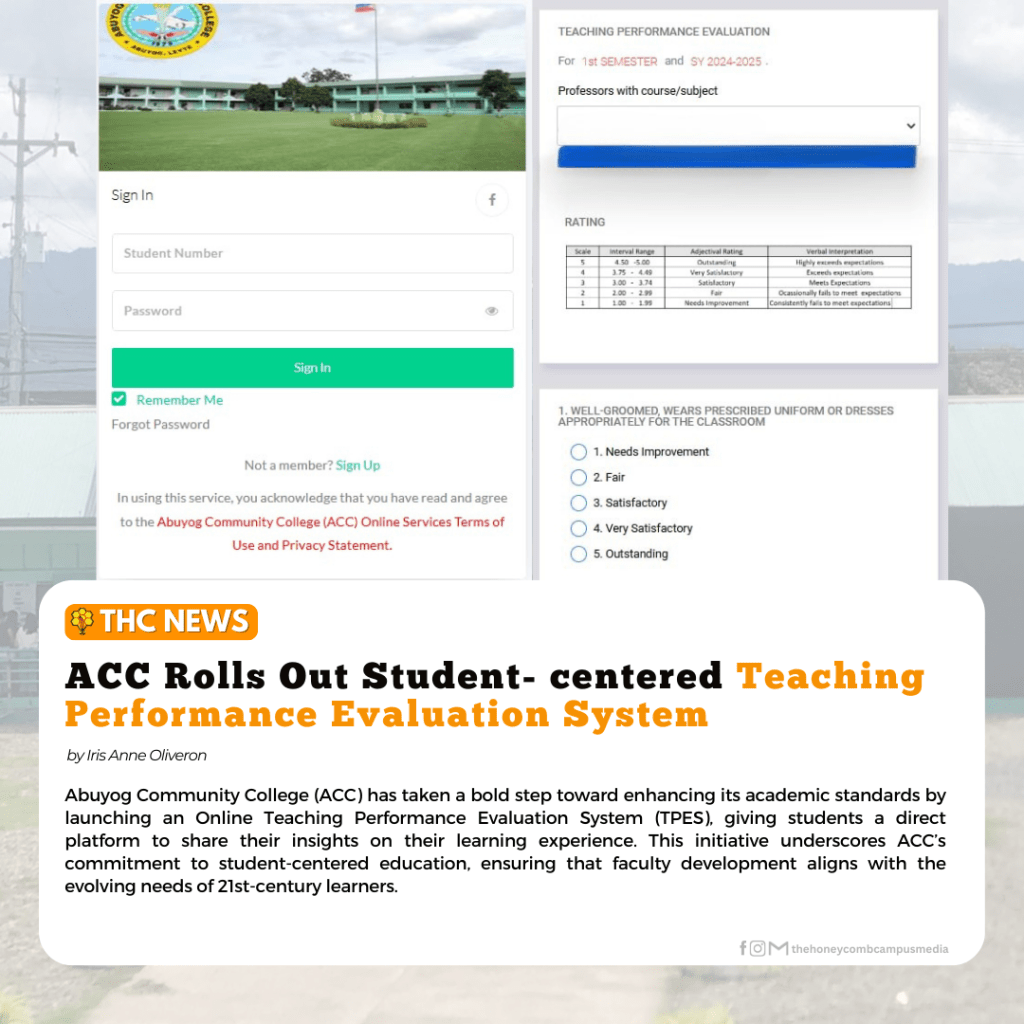ACC Rolls Out Student- centered Teaching Performance Evaluation System by Iris Ann Oliveron
Abuyog Community College (ACC) has taken a bold step toward enhancing its academic standards by launching an Online Teaching Performance Evaluation System (TPES), giving students a direct platform to share their insights on their learning experience. This initiative underscores ACC’s commitment to student-centered education, ensuring that faculty development aligns with the evolving needs of 21st-century learners.

With the purpose of integrating digitization and instructors’ performance appraisal, ACC-TPES was successfully implemented in the first semester of the academic year 2024-2025. Developed by Management Information System (MIS) coordinator and Program Developer Prof. Mark Simborio, the system is composed of 44 questions designed to assess the instructors’ performance and character, professionalism and work ethics, and lastly instructional competence.
The new system, now accessible through ACC’s online portal, allows students insightful feedback and rate their subject instructors on a scale of 1 to 5, with 5 as the highest grade. The system, designed for accessibility and ease of use, encourages students to express their honest assessments, fostering a culture of accountability and continuous improvement within the faculty.
During the first semester of this academic year, an impressive 3,398 responses were recorded from ACC’s total student population of 4,144. This remarkable turnout reflects the students’ willingness to engage in the evaluation process, reinforcing their commitment to academic progress and excellence.
College President Dr. Clemelle Montallana underscored the administration’s commitment to monitoring faculty performance and taking necessary action against violations or incompetence. He emphasized that instructors found guilty of ethical breaches or failing to meet ACC’s teaching standards would face serious consequences.
“This initiative is not just about evaluation; it is about growth and collaboration. We value the insights of our students as they are at the heart of our academic community,” Montallana asserted.
Beyond ensuring accountability, the evaluation system also seeks to recognize and reward faculty members who consistently demonstrate excellence, professionalism, and integrity in their teaching. Dr. Montallana affirmed that merited educators would be acknowledged for their contributions, further fostering a culture of excellence within the institution.
“May tinatawag kaming Gawad Lampara, ito ay pagkilala sa mga guro na may magandang gawa; so, they will be awarded and since every single year nagkakaroon kami ng performance appraisal, so thus dadagdagan natin ang kanilang grade, kapag maganda ang kanilang grade they can be promoted,” Montallana added.
On the other hand, ACC faculty members have shown positive perspectives on the digital evaluation system.
College of Arts, Sciences and Education (CASE) faculty and Guidance office coordinator, Dr. Joel Comaling, believed that the system is an effective strategy to assess the teachers’ performance; likewise, student feedback serves as guidance to hone better teachers.
“Teacher evaluation is a perfect way to evaluate a teacher on how he or she teaches the students, on how far the students learn the lesson. It doesn’t mean it encourages students; mayroon siyang critique sa teacher; it doesn’t mean you are being put down, ibig sabihin gin-bubuligan ka para maging maupay kapa na teacher,” Dr. Comaling stated.
Additionally, Prof. Dulce Amor Cutura, College of Hospitality Management and Entrepreneurship (COHME) faculty member shared her same sentiment. Besides, she considered the students feedback essential to spot their weaknesses. Hence, they can pinpoint performance areas for further enhancement.
“We do not have the file to check our own performance; that’s why we need the feedback from our students and, of course, the purpose of that is for us to know what our strengths are, the strength of the instructors so that we’ll continue these practices and, of course, the weaknesses. Kasi doon malalaman namin ang mga weaknesses, and we can adjust so that we can further improve our teaching strategy and methodology. After all, the discussion should be tailored fit to the students’ needs.” Prof. Cutura shared.
With students playing an integral role in assessing their instructors, the online evaluation system empowers them to voice their academic experiences and concerns, strengthening the collaborative efforts between faculty and learners in shaping an environment that upholds high educational standards.
In an interview, Jeshen Manito, a first year BSEd Science student, underscored the subjectivity inherent in student evaluations. “Para sa akon adton paghimo nira sin Teacher Evaluation is one-way gihap para ma rate ba gud an performance sa mga teacher kay iba-iba baya kita sin perspective and very subjective gihap adto,” Manito said.
The ACC administration assures students and faculty alike that the evaluation process is constructive and confidential, emphasizing that the goal is not merely assessment but continuous enhancement of educational quality. With this launch, ACC reinforces its commitment to academic excellence, student empowerment, and a future where learning is a shared responsibility.




